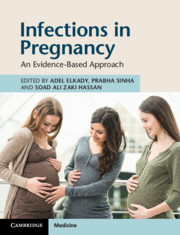Book contents
- Infections in Pregnancy
- Infections in Pregnancy
- Copyright page
- Contents
- Contributors
- Foreword
- Preface
- Section 1 Vaccination
- Section 2 Infections in Pregnancy
- Chapter 2 Viral Hepatitis
- Chapter 3 HIV Infection
- Chapter 4 Herpes Infections and Measles
- Chapter 5 Zika Virus
- Chapter 6 Parvovirus
- Chapter 7 Influenza
- Chapter 8 Cytomegalovirus
- Chapter 9 Dengue Fever
- Chapter 10 Rubella
- Chapter 11 Molluscum Contagiosum
- Chapter 12 Ebola
- Chapter 13 Chikungunya
- Chapter 14 Antibiotics during Pregnancy and Methicillin-Resistant Staphylococcus aureus (MRSA)
- Chapter 15 Gonorrhoea, Syphilis and Lymphogranuloma Venereum
- Chapter 16 Mycoplasma, Ureaplasma, Chancroid, Granuloma Inguinale (Donovanosis)
- Chapter 17 Genital Chlamydia trachomatis and Bacterial Vaginosis
- Chapter 18 Streptococcal Infection
- Chapter 19 Enterococci and Bacterial Infections
- Chapter 20 Listeriosis
- Chapter 21 Urinary Tract Infection
- Chapter 22 Infections and Preterm Labour
- Chapter 23 Appendicitis in Pregnancy
- Chapter 24 Complications Associated with Legal Termination of Pregnancy
- Chapter 25 Tuberculosis
- Chapter 26 Vulvo Vaginitis, Candida (Yeast) Infection
- Chapter 27 Malaria
- Chapter 28 Parasitic Infestation: Protozoa
- Section 3 Postpartum Infections
- Index
- References
Chapter 26 - Vulvo Vaginitis, Candida (Yeast) Infection
from Section 2 - Infections in Pregnancy
Published online by Cambridge University Press: 11 October 2019
- Infections in Pregnancy
- Infections in Pregnancy
- Copyright page
- Contents
- Contributors
- Foreword
- Preface
- Section 1 Vaccination
- Section 2 Infections in Pregnancy
- Chapter 2 Viral Hepatitis
- Chapter 3 HIV Infection
- Chapter 4 Herpes Infections and Measles
- Chapter 5 Zika Virus
- Chapter 6 Parvovirus
- Chapter 7 Influenza
- Chapter 8 Cytomegalovirus
- Chapter 9 Dengue Fever
- Chapter 10 Rubella
- Chapter 11 Molluscum Contagiosum
- Chapter 12 Ebola
- Chapter 13 Chikungunya
- Chapter 14 Antibiotics during Pregnancy and Methicillin-Resistant Staphylococcus aureus (MRSA)
- Chapter 15 Gonorrhoea, Syphilis and Lymphogranuloma Venereum
- Chapter 16 Mycoplasma, Ureaplasma, Chancroid, Granuloma Inguinale (Donovanosis)
- Chapter 17 Genital Chlamydia trachomatis and Bacterial Vaginosis
- Chapter 18 Streptococcal Infection
- Chapter 19 Enterococci and Bacterial Infections
- Chapter 20 Listeriosis
- Chapter 21 Urinary Tract Infection
- Chapter 22 Infections and Preterm Labour
- Chapter 23 Appendicitis in Pregnancy
- Chapter 24 Complications Associated with Legal Termination of Pregnancy
- Chapter 25 Tuberculosis
- Chapter 26 Vulvo Vaginitis, Candida (Yeast) Infection
- Chapter 27 Malaria
- Chapter 28 Parasitic Infestation: Protozoa
- Section 3 Postpartum Infections
- Index
- References
Summary
Vulvitis and vaginitis is defined as a spectrum of conditions that cause vulval and/or vaginal symptoms. Candida is the most common cause of vulvovaginal complaints for which women seek medical advice, especially during pregnancy.
Vulvovaginal candidiasis (VVC) is an opportunistic mucosal mycosis, and one of the most common causes of vulvovaginal itching and discharge caused by Candida species (C. albicans, C. glabrata. C. krusei, C. parapsilosis and C. tropicalis).
Candida albicans causes 80–90 per cent of vaginal fungal infection.
Ten to twenty per cent of reproductive-age women who harbour Candida species are asymptomatic and do not require therapy.
Vaginal candidiasis, commonly called ‘yeast infection, or moniliasis’, is relatively common during pregnancy (especially during the second trimester). with an estimated prevalence of 10–75 per cent.
Approximately 75 per cent of all pregnant women experience at least one episode of VVC during their lifetime, and 50 per cent of them suffer recurrent events.
- Type
- Chapter
- Information
- Infections in PregnancyAn Evidence-Based Approach, pp. 155 - 158Publisher: Cambridge University PressPrint publication year: 2019

